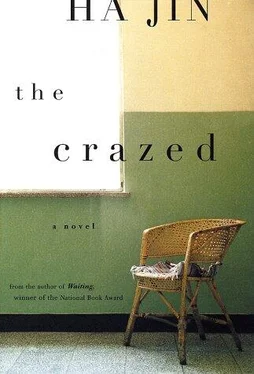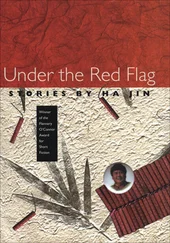“How are you, Professor Yang?” two girls asked almost simultaneously.
“Not bad.”
“Do you feel better?” A boy touched the quilt over his legs.
“Of course I’m better. I’ll be back to school in a couple of weeks.” He smiled confidently.
Before he was ill, he had been a kind of guru to some undergraduates, who believed everything he said in class and were simply spellbound by his eloquence, vast learning, and lecturing style. Once after his seminar in traditional aesthetics, a sophomore girl went up to him and gushed, “Professor Yang, every sentence you said is full of truth!” I overheard her and was somewhat embarrassed by her naïveté, but that didn’t bother my teacher, who smiled at her indulgently. He wouldn’t deny that he was an authority on truth.
Look at him now. He conducted himself as if he were in a classroom. He knew every one of these students by name, and talked with them in a voice full of assumed kindness and consideration. Damn it! I cursed mentally. Even with his blasted brain he still can play the game.
He called a delicate girl Small Lili and asked her, “How are you going to prepare for your political test this time? Memorizing the entire textbook again?”
“No,” she said, shaking her bobbed hair. “I have too much to remember this semester.” Her voice invited you to pamper her.
A boy in glasses explained, “We’ve invented a new method of handling the brain-cracking test. Thank goodness this is my last one.”
“Everybody seems to hate the political science class. Why? I don’t understand,” Mr. Yang wondered.
“It’s a waste of time,” said Small Lili. “After every test I still have no idea what I’ve learned in the course, although I always get an A. I understand the words in the textbooks all right, but the ideas simply won’t stay in my head.”
“We prefer literature to politics,” a fat girl chipped in.
The nearsighted boy said, “The teacher of our political science class is really dumb. I doubt whether he believes in the stuff he’s selling us and whether he’s a Marxist himself.” He mimicked the teacher’s squeaky voice. “ ‘Comrades, Marxism is the only compass for our course of action.’ ”
Some of them laughed. A girl nudged a boy aside so that she could get closer to their teacher.
“That’s not a proper attitude,” Mr. Yang criticized. “Human beings have always lived in some kind of political environment, so we ought to study political science, some knowledge of which I believe is necessary and invaluable.”
“We don’t deny that,” the boy said, “but Marxism isn’t everything in political science.”
“Of course not,” Mr. Yang conceded. “Still, Marxism is a powerful theory that can explain social structures and the evolution of human society. When I started reading Engels’s On Feuerbach, I had headaches, but I stuck to it. Believe it or not, little by little I grew to be fond of the book. After that, I went on to study Marx’s and Engels’s works, one after another. I read Manifesto of the Communist Party; On German Ideology; Socialist: Utopian and Scientific; The Origin of the Family, Private Property, and the State; and the three volumes of Das Kapital. I enjoyed their writings a great deal, but I’m not an out-and-out Marxist. I respect their passionate arguments and their profoundly speculating minds.” Ignoring that these youngsters knew nothing about those titles, he talked without pause and got carried away by his own discourse, just as in his class, where I had often felt that he was addressing a visualized world beyond the reach of the audience. Unlike other experienced teachers, who would modulate their tones and rhythms and pound their points home, Mr. Yang would simply speak with great gusto and without any calculation, as if possessed by a spirit. I had always admired him as a born lecturer, though I was afraid that his voice might interfere with my own teaching. As a matter of fact, one of my students had once said to his classmates that I tried to imitate my teacher. “A cat plays the tiger” was the actual remark. Yes, Professor Yang was their “tiger.” The undergraduates adored him mainly because they couldn’t always understand him.
The bespectacled boy admitted to Mr. Yang, “What you said makes sense, but we’re going to take several tests and have no time to read any of Marx’s books. At most we can only spit out what the teacher has fed us.”
“I know,” Mr. Yang said. “All I’m saying is that Marxism is a powerful theory in social sciences, which you may like or dislike, but you cannot simply dismiss it as charlatanism.”
“I didn’t say that,” protested the boy.
“But you implied that. ‘The stuff he’s selling us,’ what does this phrase mean? See, I caught you, my boy.” He gave a belly laugh.
Everybody cracked up except the nearsighted boy, who grinned, scratching the back of his head.
Arms folded, I stood in a corner and observed them with loathing. Nobody seemed aware of my presence. They prattled on and on, their topics moving from Tang poetry to contemporary fiction, from the cases in German grammar and French verbal inflections to English tenses, from painting to calligraphy, from the food quality to the dormitory conditions at different schools. They also talked about the student demonstrations in Beijing and other cities. Mr. Yang assured them in all seriousness that the government would resolve this crisis reasonably; he advised them not to act like hotheads.
I was amazed that he blended in with them so well, like a leader of a student association. He even looked healthy and happy now.
Why did he need to do this? He didn’t have to pull such a trick. They all knew he had suffered a stroke and wouldn’t have thought ill of him even if he had shown them his true condition. He was just addicted to wearing masks.
Never had he betrayed to me any knowledge of Marxism before, and I hadn’t seen a single volume of Marx’s or Engels’s writings in his home or office. God knew if he had actually read those titles he just now mentioned. I couldn’t imagine him spending months, or even years, poring over Das Kapital. But these undergraduates simply lapped up whatever he gave them. Although Mr. Yang knew German well and could read French, he didn’t know English at all; at most, his knowledge of this alphabet was merely a smattering deduced from his knowledge of the other two European languages; very often when he came across an English sentence in his reading, he’d ask me to translate it for him. How come he had the temerity to talk about the English subjunctive mood and its future perfect tense? Some of these undergraduates had studied this language since middle school, but they were too fascinated by him to question the truthfulness of his words. They loved being duped.
I was sick of him, sick of his chicanery, sick of his nonsense, sick of these ignoramuses, sick of academia, sick of the hospital! I was sick of everything!
At long last the students were ready to leave. They said, “See you soon in class, Professor Yang.”
He smiled and promised, “Sure, see you later.” He even lifted his swollen hand halfway, waving at them slowly.
Passing by, Small Lili turned and locked her eyes on me. I recognized the meaning of her gaze — she envied my good fortune in accompanying their great teacher, their demigod. It was as if just by staying with him in this room I were crowned with an aureole and achieved a sort of apotheosis, attractive to girls despite my unremarkable face.
The door closed, leaving him and me alone. I wondered what he was going to say. I waited patiently for him to explain why he had acted like a fraud.
“Why do you keep looking at me like that?” he asked without turning his face to me.
Читать дальше

![Lao Zi - Dao De Jing [Tao Te Ching] (english)](/books/3890/lao-zi-dao-de-jing-tao-te-ching-english-thumb.webp)
![Lao Zi - Dao De Jing [Tao Te Ching] (chinese)](/books/3891/lao-zi-dao-de-jing-tao-te-ching-chinese-thumb.webp)
![Lao Zi - Dao De Jing [Tao Te Ching] (espanol)](/books/3892/lao-zi-dao-de-jing-tao-te-ching-espanol-thumb.webp)







